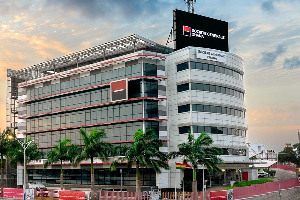- Home - News
- TWI News | TV
- Polls
- Year In Review
- News Archive
- Crime & Punishment
- Politics
- Regional
- Editorial
- Health
- Ghanaians Abroad
- Tabloid
- Africa
- Religion
- Election 2020
- Coronavirus
- News Videos | TV
- Photo Archives
- News Headlines
- Press Release
General News of Friday, 25 February 2011
Source: GNA
Osei-Adjei, Gyimah to open defence on two counts
Accra, Feb. 25, GNA - The Financial Court division of Fast Track Hig= h Court, on Friday asked a former minister and a banker to open their defence on two counts after acquitting them of six charges levelled against them by the state. Mr Akwasi Osei-Adjei, ex-Minister of Foreign Affairs and Regional Integration and Daniel Charles Gyimah, former Managing Director of the National Investment Bank (NIB), will open their defence on charges of conspiracy and contravening the Public Procurement Act on March 25, 2011. The two were facing eight counts of conspiracy, contravention of the provision of the public procurement Act (Act663), use of public office for profit, stealing and wilfully causing financial loss to the state to the tune of 1,408,590 dollars (GH¢1,524,952).
They have pleaded not guilty to the various charges and have been admitted to bail in the sum GH¢200,000 with two sureties each. The ruling of the court came after the prosecution had presented 17 witnesses and closed its case. The defence then filed for 93no case" aga= inst the accused persons.
Mr Justice Bright Mensah, the trial judge, presenting the various arguments for and against the submission of 93no case", said the defence= in its submissions had argued that it was dependent on the prosecution to prov= e the guilt of the accused persons beyond all reasonable doubt. He said the defence further argued that the court was obliged to ensur= e that sufficient evidence had been established against the accused persons. Mr Justice Mensah said the prosecution countered this argument saying its responsibility was to ensure that a prima facie case was established against the accused persons. He said the prosecution also argued that it was up to the court to determine whether a prima facie case had been established against the accused persons so that they could be asked to open their defence. Mr Justice Mensah in his ruling said the position of the law was that the court had the duty to ensure that the evidence adduced by the prosecution could establish a prima facie case against the accused persons. He said arguments put forward by the prosecution, failed to establish a prima facie case against the accused persons on charges of use of public office for profit, stealing and wilfully causing financial loss to the stat= e and were therefore being acquitted and discharged accordingly. However, they are to open their defence on conspiracy and contravening the Public Procurement Act.
Mr Anthony Gyambiby, Chief State Attorney, after the ruling, commended the judge for his insightful delivery and enriching the law. He also commended the defence for cooperating with the prosecution throughout the trial and asked them for more cooperation as the trial proceeded.
Mr Godfred Yeboah Dame, counsel for Osei-Adjei, drew the court's attention to a statement attributed to Mr Martin Amidu, Attorney General (AG) and Minister of Justice, on air forecasting the outcome of ruling. He said Mr Amidu predicted that the state was going to win two out of the eight charges levelled against persons. However, Mr Gyambiby, who came to the defence of the AG, said the minister did not prejudice the ruling. The facts are that in February 2008, the former Minister of Trade and Industry, Mr Joe Baidoo Ansah initiated the importation of the rice from India. In a letter dated February 13, 2008 he requested the government of Ghana through the High Commission of India in Ghana to buy 100,000 metric tons of 25 per cent to 35 per cent broken rice.
The rice was to arrive in Ghana by May 2008 "to help curb the severe increase of price of staples in Ghana" and the designated consignee was the Ghana National Procurement Agency.
Mr Baidoo Ansah in another letter dated on April 10, 2008 addressed to the Minister of External Affairs of India, referred to an earlier meeting held between ex-President John Agyekum Kufuor and the Minister of Commerce of India.
In the said letter, Mr Baidoo Ansah drew attention to "severe food situation looming in Ghana" and sought to procure from the government of India 300,000 metric tons of low grade white 25 per cent broken rice for shipment to Ghana by June 2008.
However, in April 2008, Osei-Adjei took over the effort of Mr Baidoo Ansah and nominated NIB as the sole consignee. Gyimah represented his bank and negotiated the terms of the contract with State Trading Corporation of India through the Ghana High Commission i= n India.
Osei-Adjei instructed the High Commissioner to sign the contract on behalf of the government of Ghana.
The contract was executed and 15,000 metric tons of 25 per cent broken rice was to be shipped by Amira Foods Limited (AFL) of India, a private shipping company. The rice arrived in Ghana in February 2009. Initially, the export of the rice to Ghana was supposed to be a grant but it later turned into a commercial transaction, the prosecution said, noting that Gyimah approached Citibank to issue Letters of Credit to cover the value of the consignment.
On arrival of the rice, efforts by the NIB to get import tax exemption from the Ministry of Finance and Economic Planning (MOFEP) to clear the ric= e were turned down owing to commercial nature of the contract and more so as the Ministry was not involved in the transaction. The rice was in former Customs, Excise and Preventive Service (CEPS) bonded warehouse.
However, after counting the consignment, 2,997 bags of rice were missing and the remaining quantity of rice was in varying states of wholesomeness.
The prosecution said NIB was making efforts to sell the rice through the tender.
According to prosecution, investigation conducted by the BNI revealed that provisions of the Public Procurement Act were not followed and that th= e missing 2,997 bags had been diverted for sale elsewhere for huge private profit.










